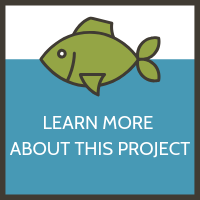January 6, 2020
Kathleen Ragsdale
Photo by Kathleen Ragsdale
Undergraduate students often face challenges gaining hands-on research-for-development fieldwork experience. Fish4Zambia, a quick start of the Feed the Future Innovation Lab for Fish, provided this opportunity to three undergraduates who joined the research team as student field assistants for seven days in Zambia in July 2019.
Robert Sakapaji and Mwatikosela Tembo from the University of Zambia (UNZA) and Laura Ingouf from Mississippi State University (MSU) helped with collecting data in the Lake Bangweulu region of Samfya District, Luapula Province. During this time, the Fish4Zambia team administered 397 Women’s Empowerment in Fisheries Index (WEFI) surveys to men, women, and youth across the fish value chain and conducted 21 focus group discussions among men and women and youth across the fish value chain.
Discussing his first day of fieldwork, UNZA undergraduate Sakapaji, who is pursuing a Bachelor of Science in agricultural economics, said, “The first experience in the field was so amazing…The families in the camps were so welcoming and eager to respond to our questionnaire. Our team managed to interview 17 adults for the WEFI and conducted two focus group discussions (one with men and one with women) in the fishing camp.”
Sakapaji has since leveraged his experience on the Fish4Zambia team into an internship at WorldFish Zambia.
Another UNZA undergraduate, Tembo is pursuing a Bachelor of Science in human nutrition. About one of her focus groups with youth, Tembo said, “When asked what type of programs or assistance would be most helpful for them to succeed, I found it very interesting that the youth pointed out that teaching them methods on how to save money and connecting them to people that can readily buy their fish would be very beneficial.”
About her experience surveying women, some of whom were widows, Tembo said, “It was an awesome experience as they spoke about their different issues pertaining to why fishing, fish processing and fish trading has such important impacts on their lives, particularly how [these activities] helped them earn the income necessary to ensure their children are fed and clothed and their children’s school fees are paid.”
MSU undergraduate Ingouf,[1] who is pursuing a Bachelor of Arts with a double major in anthropology and history, has a passion for linguistics and noted the challenges related to conducting research across language barriers.
During the WEFI Enumerator Training Workshop, “it sometimes took our enumerators several minutes to agree on how to translate a question,” said Ingouf. “Many of the [WEFI] questions ask about decision-making, a concept which doesn’t have an easy direct translation into Bemba. But our enumerators eventually decided to translate it using a Bemba word meaning something like power, along with further explanations of what exactly the question is asking. They also had to translate the responses they received from Bemba to English as they input them into the tablets. Throughout our time conducting fieldwork here, we were constantly being made aware of the impact and importance of language.”
To prepare for the fieldwork and data collection, the three student field assistants completed Focus Groups 101: Brief Guide to Conducting Focus Groups in Village Settings[2] and attended Fish4Zambia’s full-day WEFI Enumerator Training Workshop in Samfya. These activities provided training that is useful to their current institutions and will be valuable to the students themselves should they pursue graduate work or careers in research.
During the Fish4Zambia fieldwork, Sakapaji, Tembo and Ingouf were directly supervised and mentored by Kathleen Ragsdale, Fish4Zambia U.S. PI and research professor at MSU, and Pamela Marinda, Fish4Zambia co-PI and lecturer at UNZA. The students served as notetakers during the focus group discussions led by Ragsdale, Marinda, Tabitha Mulilo (WorldFish Zambia) and representatives from the Zambia Ministry of Fisheries and Livestock. Because Sakapaji and Tembo also spoke the local language of Bemba, they were able to gain additional hands-on experience administering the WEFI after their teams’ focus groups were completed each day.
This initial research from the Fish4Zambia team will inform efforts to improve nutrition security and access to income-generating work for women in the region. The individual and institutional capacity developed through these research activities will have lasting impact as the results of the research will be used to address needs along the fish value chain in the Lake Bangweulu region and beyond.
[1] Ingouf’s training and travel were funded by two MSU undergraduate research fellowships. Ingouf was assisted with developing her proposal by Ragsdale.
[2] This one-hour webinar was developed by Ragsdale and Mary Read-Wahidi, Fish4Zambia U.S. co-PI and assistant research professor at MSU, and produced by the Feed the Future Innovation Lab for Soybean Value Chain Research.
Ragsdale is a research professor at the Mississippi State University Social Science Research Center and is the U.S. PI for this project.

